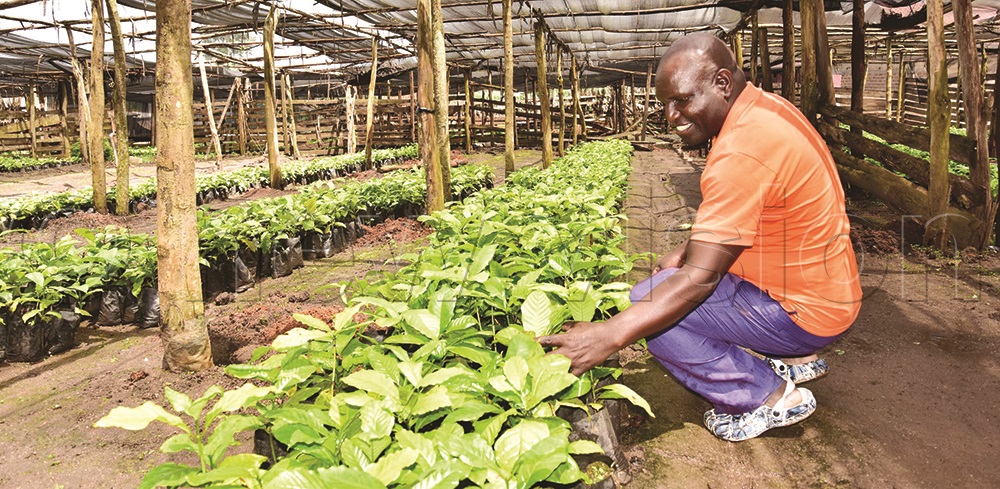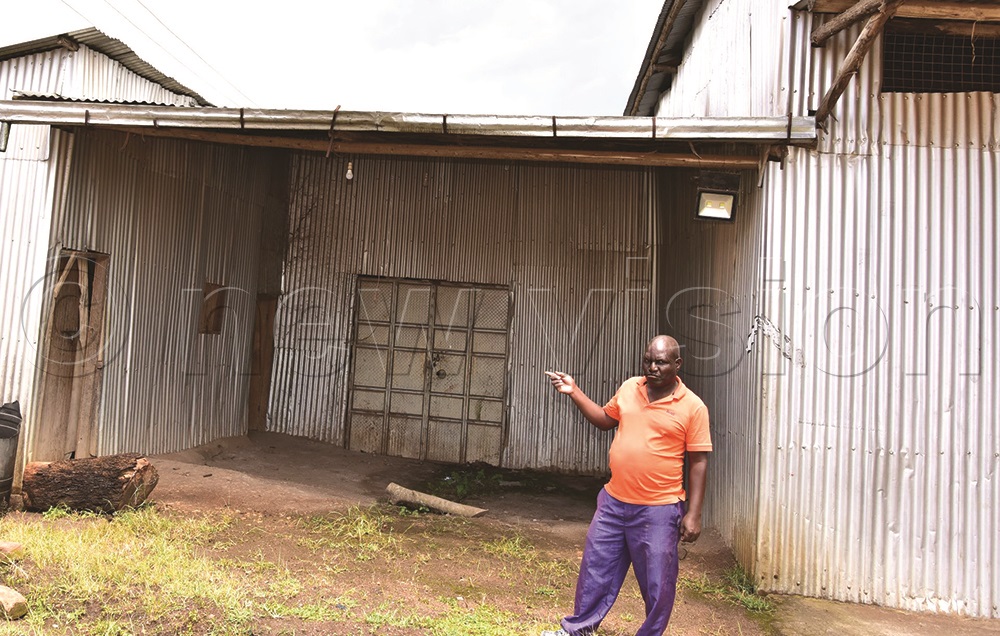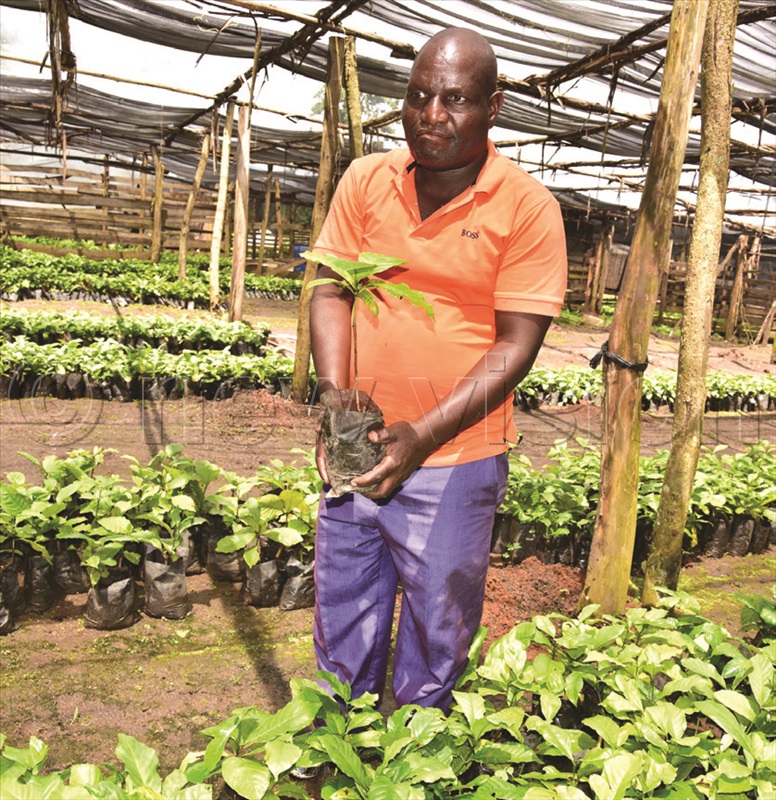For the eighth year running, Vision Group, together with the Embassy of the Netherlands, KLM Airlines, dfcu Bank and Koudjis Animal Nutrition, is running the Best Farmers’ competition. The 2023 competition runs from March to November, with the awards in December. Every week, Vision Group platforms will publish profiles of the farmers. Winners will walk away with sh150m and a fully paid-for trip to the Netherlands.
By Umar Nsubuga
Yekosefati Sekabembe’s success story in commercial farming will encourage anyone to join the venture. A visit to the 48-year-old’s farm in Kiyunga, Naluwonga parish, Mubende district, is incomplete without a taste of coffee.
Coffee growing, his main enterprise, sits on over 25 acres of land. Much as he is a well-known farmer and voted best farmer in the recent Mubende farmers exhibition, his influence spreads across the district.

Sekabembe also owns one of the biggest coffee nursery beds in the area, it sits on half an acre and it has over 100,000 seedlings, which he sells to other farmers. While most coffee growers use artificial herbicides and fertilisers, Sekabembe focuses on organic coffee farming.
“After my Primary Seven in 1989, there was no fees to further my studies. I did not despair because I had already planned to go into farming,” Sekabembe says.
“I thought since agriculture played an important role in Mubende and the entire country, and it’s one of our country’s export revenues, it was the only breakthrough I could count on. And since there was a 10-arce piece of land I had bought in 2001, I decided to use it to grow coffee for a living. I have never regretted my decision, and now I own 25 acres, of which I have been slowly expanding.”
How he started
Sekabembe started planting coffee in 2002 with clonal coffee on two acres. After undergoing training for five months and acquiring experience in coffee growing, he discovered that organic farming was not only a better approach to coffee growing, but also a cheaper practice he did not have to spend on pesticides and fertilisers, which could be made locally.
He got 4,500 coffee seedlings from a nearby dealer, each at sh1,000.

“I realised there was a need to increase my coffee business by producing my own. Besides, I wanted to have coffee gardens that I would use to educate farmers on harvest handling,” he adds.
Sekabembe harvests between 700kg-900kg per acre that are then sold at sh4,000 each before being processed and when it’s processed sh8,200 per kilogramme.
Averagely, he harvests 17,500kg from 25 acres, bagging over sh50m each season. He, however, notes that coffee prices are unstable varying from sh4,000 and sh4,500; sh7,500 and sh8,000.
He says organic farming is also a safe way to stay healthy by both the farmer and the consumer as purely organic farm materials are used, thus no side effects.
“The environment is safe from the damage caused by chemical sprays. Organic manure also promotes the growth of natural organisms in the soil, boosting the growth of coffee plants.”

Globally, people are increasingly mindful of their health, which gives organic food high demand in both the local and international markets, Sekabembe notes.
“As part of my organic farming programme, I carry out intercropping where I grow coffee on the same plot of land with fruit trees.”
The trees provide him with timber, while he also makes organic manure and pesticides out of natural materials. He also says security at his farm is commendable.
“We don’t have thieves in our area because most of the residents are farmers.”
Organic manure
The raw materials he uses are animal urine, water, red chillies, wood ash, herbs, such as marigolds, phytolaca (asali), garlic and onions.
Once the ingredients are mixed, they are left to ferment for 14 days and then used Sekabembe earns sh50m each season from coffee for spraying coffee plants to protect them from diseases and pests that destroy the leaves and beans.
Sekabembe also makes manure from animal droppings, leftover food and peelings in a compost pit, where they are left to decompose for 21 days before they are used to fertilise the coffee plantation.
Although organic farming is a demanding activity, it is worth the effort since it ensures safety for the farmer, consumer and the environment while giving high yields and proceeds.
Costs and labour
Sekabembe involves his family, through the distribution of labour.
“Prior to the beginning of a season, we convene a pre-season planning meeting,” he says.
He says preparations for the next season of the coffee estate commence in the month of January. It includes recruiting a labour force of 10 people to slash the overgrown grass.
I normally pay casual labourers sh5,000-sh10,000 per day. It takes three weeks for the work to get done. By the end of the three weeks, each labourer will have earned sh105,000.
Sekabembe says the farm usually requires 100kg of pesticide. Each kilogramme of pesticide goes for sh25,000, making a total of sh2.5m. Usually, the spraying exercise requires a labour force of 10 people. Each labourer would earn sh3,000 per day.
In April, a farmer is obliged to apply fertilisers. A bag of fertilisers costs sh90,000. Sekabembe says they use 100 bags of fertilisers, which cost sh900,000. The exercise which lasts two weeks, would require a labour force of 10 people. Each labourer earns sh42,000. The total wage bill of 10 labourers is sh420,000.
Dry spells
Although Mubende sometimes experiences prolonged dry spells, Sekabembe’s coffee plantation is not affected because he irrigates his crops using water from a reservoir he constructed. He saved sh18m to buy tanks and pipes in the garden.
Community impact
Sekabembe says there are several farmers who have started growing coffee using modern methods.
“When I realised that coffee is a money-maker, I encouraged people in my area to start growing it.”
He says he is turning Kiyunga into a model coffee-growing village. At the moment, there are eight farmers who Sekabembe is helping to set up coffee farms.
“Each of these farmers has an average acre of coffee. This means that there are over 30 acres of coffee that I have inspired in this area,” Sekabembe says.
Harvest and market
Higher export prices are the first step towards securing higher incomes for farmers, Sekabembe notes.
“Organic coffee commands higher prices on the international market, compared to conventional coffee.”
For example, while a kilogramme of inorganic coffee costs sh3,500 on average, organic coffee goes for sh6,000.
“I have 11,250 coffee trees that yield 1.3kg of coffee beans, translating into 14,625kg of coffee per season,” he says.
As a result, he earns at least sh53m from a single season’s sales after all expenses are offset. This has enabled him to fend for his children by providing them with basic needs, such as school fees, medication, clothing and shelter.
He says he sells his coffee to the Uganda Coffee Farmers’ Alliance. They approached him because he has good and standard coffee.
About 20% of Uganda’s population earns a living from coffee and if quality products and suitable farming infrastructure are emphasised, the crop will enable Uganda to attain middle-income status.
Apart from paying his children’s tuition fees, he has set up other businesses, including a fuel station.
“I also started a crop drug shop, which helps residents not to move long distances,” he says.
Challenges
Sekabembe says Uganda’s economy entirely hinges on the agricultural sector, but the Government has not considered it as a key priority.
“Almost every imported agro-input ranging from fertilisers to pesticides, is quite expensive for farmers because of the taxes heaped on them,” he notes.
“It is not easy to get trusted workers at the farm. Some of the workers are lazy and have to be pushed before they do any work. Others are thieves.”
Advice to coffee farmers
Sekabembe advises farmers to consider coffee as an important crop. There is hope for better coffee prices and market, but that it is dependent on the kind of care for the coffee on and off the farm.
Success has come out of the hard work, sacrifice and conducive environment. I was also encouraged by one of the progressive farmers in the area.
Why coffee?
The Government plays a major role in the coffee sector, contributing to about 30% of Uganda’s foreign exchange earnings and employs more than 3.5 million people.
Globally, coffee consumption is growing at a rate of 2.5% and by 2030, the world’s demand for coffee is projected to rise to 200 million bags, up from the current 160 million bags.
Africa, including Uganda, is expected to contribute the most to the increased production. Coffee consumption in Uganda is growing, although at a slow rate.
Sekabembe says coffee does not require a lot of land and it favours inter-cropping.
“On one acre, one can grow coffee and inter-crop it with beans, matooke and soy bean.” All you need is to practise proper agronomics, and you will make money,” he said, adding that the practice also ensures food security for the farmer.
As a country, we have very little to do with the prices, even if we multiplied our production now. Therefore, people need not to worry that we will produce too much,” he said.
Sekabembe encouraged Ugandans to love their coffee and carry out proper agricultural practices such as mulching, weeding, stumping and pest and disease control.
Adding value
Sekabembe says sometimes the yields depend on the weather conditions. After harvesting the coffee beans, they are put in a drum full of water.
“All the coffee beans that sink are deemed good, while the ones that float are of poor quality,” he says.
Those that float are removed, dried separately and sold at a lower price than the good ones. On the other hand, the good coffee is taken to a pulping machine which we bought as coffee farmers.
It is where the red skin is removed. After pulping, the coffee is dried on raised beds.
Sekabembe says most Ugandan coffee farmers have not embraced value addition.
“What do those people in America do to the coffee that we cannot do here?” Sekabembe asks.
Sekabembe’s dream is to start processing coffee because all the machines are available and it is going to help all farmers grow.





